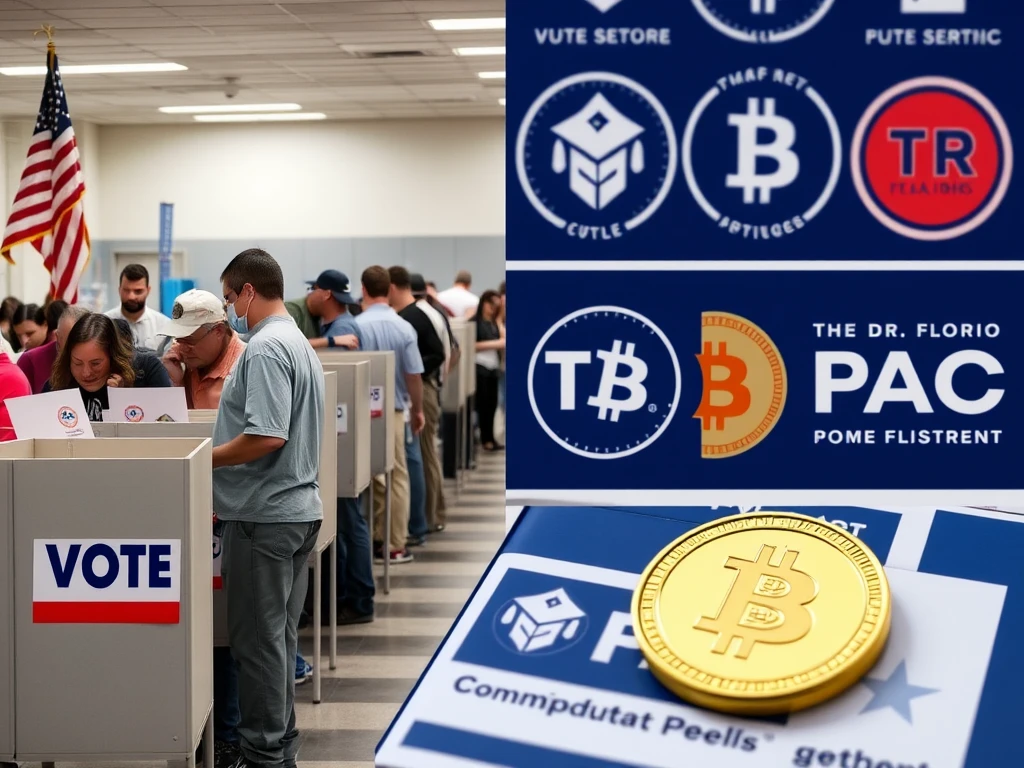Crucial Crypto PAC Boost: Last-Minute Push to Sway Florida Voters

Florida is currently a hotbed of political activity as special elections loom, and cryptocurrency Political Action Committees (PACs) are injecting significant funds into the campaigns. With the potential to reshape the balance of power in the House of Representatives, these races are drawing national attention. Are Florida voters about to witness a significant shift influenced by the burgeoning crypto industry?
What’s at Stake for Florida Voters in These Special Elections?
Two special elections in Florida’s 1st and 6th congressional districts are capturing headlines. These aren’t just routine polls; they represent a chance for Democrats to chip away at the Republican majority in the House. While political analysts suggest it’s an uphill battle for Democrats, the stakes are undeniably high. A narrowing of the Republican advantage could have considerable implications for legislative agendas, particularly concerning emerging sectors like cryptocurrency. The outcome of these special elections could influence how Congress approaches critical decisions on market structure and stablecoin regulation, topics of immense interest to the crypto community.
Crypto PAC Money Floods into Florida Campaigns
Enter the Defend American Jobs PAC, a crypto-backed powerhouse affiliated with Fairshake, which has already splashed over $131 million in the 2024 election cycle. This PAC has funneled a combined $1.5 million into media spending to support Republican candidates Jimmy Patronis and Randy Fine. They are facing Democratic contenders Gay Valimont and Josh Weil, respectively. This substantial financial injection underscores the growing political muscle of crypto PACs and their determination to back candidates aligned with their industry interests. Elon Musk’s America PAC is also contributing, albeit on a smaller scale, further highlighting the diverse sources of funds influencing these races.
David vs. Goliath? Candidate Funding and PAC Influence
Interestingly, traditional campaign finance dynamics are being challenged in these races. Democrats Valimont and Weil have out-raised their Republican opponents by a significant margin – $6.5 million and $10 million compared to Patronis and Fine’s $1 million each, as of March reports. However, these figures don’t account for the massive media buys from PACs like Defend American Jobs. This creates a fascinating scenario where candidates with less direct funding are being significantly boosted by external political action committee spending. It raises questions about the true financial landscape of these elections and the weight of PAC influence versus grassroots fundraising.
Here’s a quick comparison of candidate funding (excluding PAC money):
| Candidate | Party | Reported Funding (as of March) |
|---|---|---|
| Gay Valimont | Democrat | $6.5 million |
| Josh Weil | Democrat | $10 million |
| Jimmy Patronis | Republican | $1 million |
| Randy Fine | Republican | $1 million |
Echoes from Michigan: Is This a New Normal in Political Campaigns?
The influence of crypto-backed PACs isn’t confined to Florida. Michigan Representative Shri Thanedar, a Democrat, shared his surprise about receiving support from Protect Progress, another Fairshake-affiliated PAC, during his 2024 primary. He openly acknowledges the broader issue of “dark money” in politics, noting that various industries utilize PACs and Super PACs. His perspective underscores a critical debate: While crypto PACs are currently in the spotlight, they are part of a larger system of political action committee spending that pervades American politics. Thanedar’s comments suggest a need for campaign finance reform to address the impact of all forms of “dark money.”
Looking Ahead: The Future of Crypto PACs and Political Influence
Following the 2024 elections, where several “pro-crypto” candidates found success, Fairshake has indicated they plan to maintain an active role in future elections. With a substantial war chest exceeding $116 million, they are poised to be a significant player in the 2025 and 2026 cycles. Major crypto firms like Coinbase and Ripple Labs are key contributors, signaling the industry’s long-term commitment to crypto regulation and favorable political outcomes. While Fairshake remained tight-lipped about the immediate Florida elections, their past support for Patronis and Fine suggests a continued strategy of backing candidates they believe will champion crypto-friendly policies. The question remains: will this level of financial influence reshape the political landscape and sway future policy decisions concerning the crypto industry?
Conclusion: A Turning Point for Crypto and Politics?
The Florida special elections serve as a crucial test case for the growing influence of crypto PACs in US politics. As Florida voters head to the polls, the outcome could not only impact the House majority but also signal the future trajectory of crypto industry engagement in the political arena. The significant financial backing from crypto PACs, juxtaposed with traditional campaign funding dynamics, highlights a shifting landscape. Whether this signifies a lasting change or a temporary surge remains to be seen, but one thing is clear: crypto’s political voice is becoming increasingly louder and harder to ignore.







